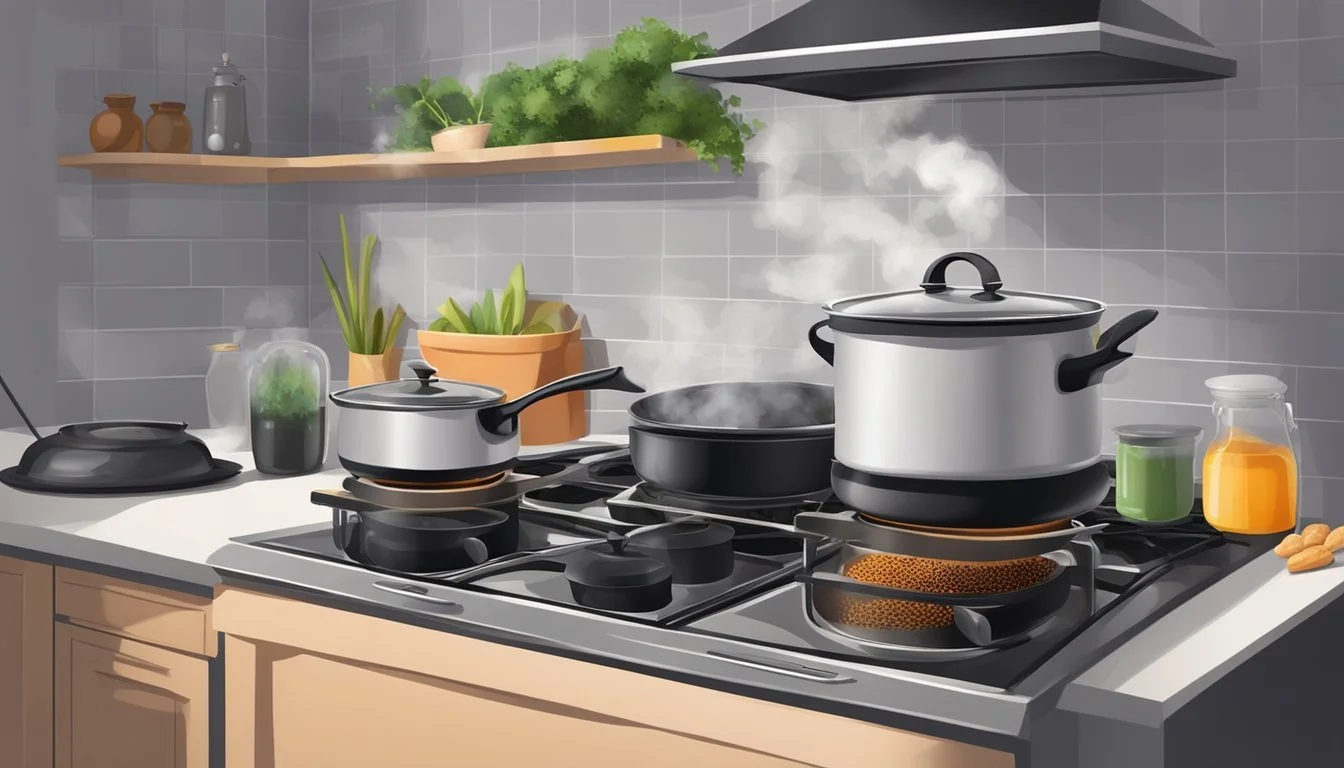How Long Do Black Lentils Last?
Understanding Shelf Life and Storage Tips
Black lentils (how long do lentils last?), also known as Beluga lentils due to their resemblance to Beluga caviar, are prized for their rich flavor and firm texture. They are a nutritional powerhouse, packed with proteins, fiber, and minerals. When considering their shelf life, black lentils are similar to other dried legumes, which means they can last quite a long time when stored under proper conditions.
Dried black lentils can typically last for up to two to three years if kept in a cool, dry, and dark place. Their shelf life can be extended if they are left unopened in their original packaging. While they may be safe to consume beyond this point, their quality, taste, and cooking times may be affected.
It's crucial to note that moisture is the enemy of dried lentils. Proper storage is essential to prevent spoilage and maintain their quality. Lentils, like many other dried legumes, do not have an expiration date but often come with a "best if used by" date, which serves as a guideline for optimal quality rather than a safety indicator.
Characteristics of Black Lentil
Black lentils, also known as Beluga lentils, are a type of small, lens-shaped legume that are notable for their sturdy texture and deep black color. Widely recognized for their likeness to caviar, they are an appealing addition to a variety of dishes.
Nutritional Profile:
Protein: Black lentils are a rich source of plant protein, making them a staple in vegetarian and vegan diets.
Fiber: High in fiber, they promote digestive health and can aid in controlling blood sugar levels.
Iron: An excellent source of iron, vital for oxygen transport in the blood.
Folate: They contain folate, important for DNA synthesis and repair.
Zinc: Contains zinc, which supports immune function.
Potassium: High in potassium, contributing to cardiovascular health.
Magnesium: Offers a good amount of magnesium, crucial for many body processes.
Carbohydrates: While they do contain carbohydrates, these are complex and healthful.
Health Benefits: Black lentils are not only nutritionally dense but also contain a variety of essential nutrients. The presence of polyphenols, an antioxidant, supports in combating oxidative stress in the body.
Culinary Uses: Their robust nature allows them to maintain a firm texture after cooking, which makes them a preferred ingredient in salads and other dishes where a distinct texture is desired.
Given these characteristics, Black lentils serve as a versatile and nutritionally robust component in many diets, supplying essential nutrients while also delivering health-promoting properties.
Proper Storage Techniques
When it comes to black lentils, ensuring freshness and prolonging shelf life is directly tied to proper storage techniques. Each storage method is crucial in maintaining the lentils' quality and preventing spoilage.
Storing Dry Black Lentils
Dry black lentils should be kept in an airtight container such as a glass jar or sealed plastic bag to protect them from moisture and pests. They should be placed in a cool, dry, and dark location, preferably a pantry or cupboard. Under these conditions, dry black lentils have a shelf life of up to 3 years.
Packaging tips for dry lentils:
Use food-grade Mylar bags as an extra protection layer.
Include oxygen absorbers to reduce air exposure.
Storing Cooked Black Lentils
Cooked black lentils must be stored in the refrigerator within two hours of cooking to prevent foodborne illnesses. They should be kept in a sealed container to avoid absorbing flavors and should be consumed within a 3- to 5-day period.
Refrigeration guidelines:
Temperature: Keep at 40°F (4°C) or below.
Container: Opt for shallow, airtight containers or resealable bags.
Freezing Black Lentils
Freezing black lentils is an effective way to extend their shelf life. It is essential to cool the lentils completely before freezing to prevent ice crystal formation. Store them in freezer-safe airtight containers or bags. Properly frozen black lentils can last for up to 6 months.
Freezing process:
Portion: Freeze in usable quantities to avoid defrosting more than needed.
Thawing: Refrigerate overnight to thaw for best texture preservation.
Legume Longevity Hacks
Maximizing the shelf life of both dry and cooked black lentils can be accomplished through diligent storage methods. Dry lentils benefit from vacuum-sealed packaging, while cooked lentils' longevity is enhanced when cooled rapidly and stored promptly.
Additional tips:
Dry lentils: Check for an expiration date and refresh stock accordingly.
Cooked lentils: Rinse under cold water to remove extra starch and cool them faster before storage.
Culinary Uses of Black Lentils
Black lentils, recognized for their firm texture and flavor, are a valuable plant-based protein source that can be flexibly used in a variety of dishes from salads to soups.
Incorporating Black Lentils into Meals
Black lentils, with their rich earthy flavor, are a versatile bean that elevates numerous dishes. Salads gain a nutritious boost and appealing texture when black lentils are added. In soups and stews, they provide a satisfying heartiness. Vegan and vegetarian cooks often favor black lentils for their protein content, creating robust entrees such as lentil curry. For those seeking a simple, yet flavorful side dish, black lentils can be seasoned with garlic, onion, bay leaves, and thyme to create a complementary staple for various meals.
Preparation and Cooking
Before cooking, black lentils usually do not require soaking and can be directly prepared, which is a convenient feature for many home cooks. Here's a brief guide to their preparation:
Cooking Time:
On Stovetop: Rinse the lentils, then combine 1 cup of black lentils with about 2 1/2 cups water or vegetable broth in a pot. Bring to a boil, then cover and simmer for 20-25 minutes.
In Instant Pot: 15-20 minutes on high pressure with natural release is sufficient.
Lentil Recipes:
Lentil Salad: Toss cooked and cooled lentils with your choice of fresh vegetables and a vinaigrette.
Lentil Soup: Simmer lentils with a base of onions, carrots, celery, and seasonings, adding greens in the last few minutes.
Cooking them just right ensures they retain their shape and texture, making them an excellent ingredient for a vast array of recipes from a simple lentil salad to a hearty lentil soup.
Understanding Spoilage
Spoilage in black lentils can occur due to a variety of factors including improper storage, moisture exposure, and bacterial growth, leading to a decline in quality and potential health risks.
Indicators of Spoilage
Visual Inspection: Black lentils that exhibit discoloration or the presence of mold are clear indicators of spoilage. Mold can appear in various colors such as white, green, or black spots.
Odor: An off smell, often musty or sour, is another reliable sign. Spoiled lentils might also emit an aroma that is markedly different from their naturally earthy scent.
Texture Changes: If the lentils feel slimy or stick together abnormally, this could be a result of unwanted moisture and bacterial growth.
Excess Gas or Bloating in Packaging: This may indicate fermentation or bacterial activity inside the packaging.
Proper storage is essential to prevent these signs of spoilage. Black lentils should be kept in a cool, dry place away from direct sunlight.
Health Risks of Spoiled Lentils
Food Poisoning: Consuming spoilt black lentils can lead to food-borne illnesses caused by bacteria such as E. coli or Salmonella.
Mycotoxins: Some molds produce harmful toxins which may not be destroyed by cooking, posing serious health risks if ingested.
Repeated exposure to spoiled food including spoiled lentils can cause long-term health effects, so it is vital to heed the signs of spoilage and ensure proper food safety practices are followed.
Nutritional Benefits
Black lentils, also known as Beluga lentils, are a powerhouse of nutrition, which makes them a valuable component of a balanced diet, especially for those following a plant-based lifestyle. Lentils, in general, are an excellent source of plant-based protein, with black lentils containing approximately 25% protein. This makes them a crucial source of this macronutrient that is essential for muscle repair and growth.
They are also rich in dietary fiber, both soluble and insoluble, which aids in maintaining digestive health. Soluble fiber can help to lower cholesterol levels, potentially benefiting the heart by reducing the risk of heart disease. Moreover, the high fiber content assists in blood sugar control, making it helpful for individuals with diabetes or those looking to maintain stable energy levels.
Rich in essential nutrients, black lentils provide significant amounts of iron, which is particularly important for combating fatigue and for those with iron-deficiency anemia. They also offer a good source of magnesium, a mineral involved in over 300 enzymatic reactions within the human body, including those related to muscle and nerve function.
Another key nutrient found in black lentils is folate, a B vitamin necessary for cell growth and function, which plays a critical role during pregnancy for fetal development.
Incorporating black lentils into one's diet provides a variety of health benefits, thanks to their nutrient-dense profile, which supports overall well-being while catering to those seeking high-quality, plant-based protein options.
Comparative Analysis of Lentil Varieties
Lentil varieties differ in their nutritional profile, cooking requirements, and storage life. These factors are important for consumers to consider when selecting lentils for their dietary and culinary needs.
Nutritional Differences Among Lentil Types
Different types of lentils offer varying amounts of protein, fiber, and other nutrients. For instance:
Red Lentils (how long do red lentils last?): Known for their quick cooking time, they contain about 9 grams of protein and 7.8 grams of dietary fiber per half-cup serving.
Green Lentils: (how long do green lentils last?) They have a slightly peppery flavor and provide approximately 9 grams of protein and 7.8 grams of dietary fiber per half-cup serving.
Brown Lentils: These are the most common variety and offer around 9 grams of protein and 8 grams of fiber per half-cup.
French Lentils: Also called Puy lentils, they contain about 9 grams of protein and 8 grams of fiber per half-cup serving and retain their shape well when cooked.
Beluga Lentils: These small, black lentils are similar in nutrient content to French lentils and are named for their caviar-like appearance.
Cooking Differences Among Lentil Types
Cooking times and methods can vary significantly among different lentil types:
Red Lentils: Typically cook in about 15-20 minutes and tend to break down, which is ideal for soups or purees.
Green and Brown Lentils: Usually require around 20-30 minutes to cook and hold their shape well, making them suitable for salads and side dishes.
French and Beluga Lentils: Require about 25-30 minutes of cooking time. Their ability to maintain firmness makes them ideal for dishes where texture is important.
Canned Lentils: These are pre-cooked and only require heating, which is convenient for quick meal preparation.
Storage Variations Among Lentil Types
The shelf life of lentils can be impacted by their form and storage method:
Dry Lentils: When stored in a cool, dry place, they can last for several years without quality loss; however, it is generally recommended to use them within a year for optimal flavor and texture.
Canned Lentils: Have a shelf life of about one year but should be consumed within a week once opened and stored in the refrigerator.
Cooked Lentils: Regardless of type, they should be kept in the refrigerator where they last for approximately 3-5 days, or they can be frozen for up to 6 months.
Extending Shelf Life of Lentils
Storing black lentils properly is crucial to maximizing their shelf life. Dry lentils have a naturally long shelf life when kept in optimal conditions. To prevent spoilage and maintain freshness, one should store them in an airtight container. This practice limits exposure to air, which can expedite deterioration.
Where one places the lentils is equally important. A cool, dark, and dry environment, such as a pantry, helps in lengthening their usability. Ideally, temperatures should be consistent and not prone to fluctuations, as this can affect the lentils negatively.
Moisture is one of the leading causes of spoilage in black lentils. Ensuring the storage area is devoid of humidity will aid in preventing unwanted moisture from compromising the lentils. Silica gel packets are a useful addition to storage containers to absorb any excess moisture.
A common question that arises is whether lentils can be stored in the refrigerator or freezer to extend shelf life. While dry lentils are best kept at room temperature, cooked lentils benefit from refrigeration. When stored in the refrigerator, cooked lentils should be consumed within 3-5 days to ensure quality and safety.
For those who wish to keep prepared lentils longer, freezing is an option. In the freezer, cooked lentils can last for up to 6 months. To make use easier, one can freeze portions in separate containers or freezer bags.
Mindfulness of the expiration date is essential. Even though lentils can last long, they are not impervious to aging. Over time, they may lose flavor or nutritional value, so it's beneficial to use them within the timeframe recommended by their packaging.
Remembering these storage tips can help maintain the quality and extend the life of your black lentils, whether they are dry or cooked.
FAQs on Black Lentils
How long do black lentils last in storage?
Uncooked black lentils, when stored properly in a cool, dry place, can last for up to 2-3 years. It is essential to keep them in an airtight container to prevent moisture from spoiling the lentils.
Can black lentils expire?
Black lentils do not have a specific expiration date but will degrade in quality over time. Signs that lentils have gone bad include mold, off odors, discoloration, or a hard texture after cooking.
Is it possible to extend the shelf life of black lentils?
One can extend their shelf life by keeping them in an airtight container in the refrigerator, which will maintain their quality for a longer period.
Can lentils be frozen to prolong shelf life?
Although freezing is not typically necessary for dried lentils, one can freeze cooked lentils for 2-3 months. Ensure they are sealed in freezer-safe containers or bags to avoid freezer burn.
What is the best way to cook black lentils?
Cooking black lentils is straightforward—they do not require pre-soaking and can be cooked on the stovetop by simmering in water or broth until tender, typically taking about 25-30 minutes.
How can one tell if black lentils are cooked properly?
They should be tender yet hold their shape when done. Overcooking may lead to a mushy texture, while undercooking can leave them hard and difficult to digest.
Conclusion
Black lentils, like other varieties, have a considerable shelf life when stored properly. Uncooked black lentils can last up to two years if kept in a cool, dry place away from light and heat, and ideally sealed in an airtight container. They may not be unsafe to eat after this time, but their quality may decline.
Once cooked, black lentils should be consumed within 3-5 days when refrigerated. Freezing can extend their life up to six months, though some degradation in texture and flavor may occur over time.
Signs of spoilage include:
Odd smell
Visible mold
Discoloration
Damp or slimy texture
When in doubt, it is wise to discard any lentils that show signs of spoilage. Consumers should heed the "best by" dates but also rely on their senses to ascertain the quality of the lentils.
Storage Tips:
Keep uncooked lentils in an airtight container.
Store in a cool, dry place such as a pantry.
Once opened or cooked, refrigerate in a sealed container.
In summary, with proper storage, black lentils can be a durable staple, providing reliable nutrition. They are a versatile ingredient that, with minimal care, can be ready for use in a variety of healthful dishes.









